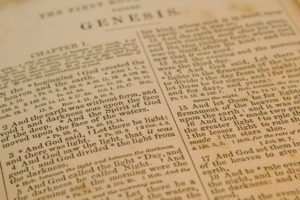The past few weeks we have been making a case for the Old Testament by going over the historical transmission, the connections between the Old and New Testaments, and the importance of using the hermeneutical method for study. We also looked at some tools and references that can help us make the task of reading and studying the Bible easier.
I used the word task because that is what we are called to do by the Word of God. We are mistaken if we think Bible study is a mystical or sensory experience. No, we are called, as Christians at any level, to be disciplined and diligent in our study of God’s Word, and this includes the Old Testament.
Genesis:
It is important to keep in mind that this book of the Bible, more than any other, has come under severe attack in the culture, especially over the last two centuries because science has married into the philosophy of Darwinian evolution that runs completely counter to Creation by intelligent Design, or better known as Creation by the God of the Bible. We spent some significant time looking at the creation vs. evolution war in our previous series called “A Case for Creation 101.” Go through that series to learn the reason why evolutionary theory is one of the greatest deceptions every foisted on our educational system.
Even within the Christian community there are debates over things like the age of the earth and the impact of the great flood of Noah’s time. Debates are nothing new in the Christian community, but we have to be careful that we are not putting secular science or other false teachings above the teachings of God in His Word. In 2 Timothy 2:14-26, Paul warns Timothy about false teachers and worthless discussions among Christians that lead people away from the truth of Scripture:
Keep reminding God’s people of these things. Warn them before God against quarreling about words; it is of no value, and only ruins those who listen. Do your best to present yourself to God as one approved, a worker who does not need to be ashamed and who correctly handles the word of truth. Avoid godless chatter, because those who indulge in it will become more and more ungodly. Their teaching will spread like gangrene. Among them are Hymenaeus and Philetus, who have departed from the truth. They say that the resurrection has already taken place, and they destroy the faith of some. Nevertheless, God’s solid foundation stands firm, sealed with this inscription: “The Lord knows those who are his,” and, “Everyone who confesses the name of the Lord must turn away from wickedness.” In a large house there are articles not only of gold and silver, but also of wood and clay; some are for special purposes and some for common use. Those who cleanse themselves from the latter will be instruments for special purposes, made holy, useful to the Master and prepared to do any good work. Flee the evil desires of youth and pursue righteousness, faith, love and peace, along with those who call on the Lord out of a pure heart. Don’t have anything to do with foolish and stupid arguments, because you know they produce quarrels. And the Lord’s servant must not be quarrelsome but must be kind to everyone, able to teach, not resentful. Opponents must be gently instructed, in the hope that God will grant them repentance leading them to a knowledge of the truth, and that they will come to their senses and escape from the trap of the devil, who has taken them captive to do his will.
We find these types of warnings to the early Church not only from the Apostle Paul, but from Peter, John, and Jude as well. God knew that false teachings would be a problem for the Church then and throughout the centuries to come. We need to head this warning still today because nothing has changed, only the modern philosophies that Satan uses in an attempt to crush God’s people.
Outline for the content and context of Genesis:
Genesis Chapters 1-11:
The Antediluvian Epoch
Here we have the first four Major Historical Events: Creation—Fall—Flood—Dispersion (Tower of Babel).
Chapter 1 gives us the Creation event and the first recorded miracle of the Bible, Creation itself.
Chapter 2 retells the Creation event with a focus on humans who have been created in the image of God and have a personal relationship with Him and each other; God gives them the task of taking care of the creation.
Chapter 3 is the chapter of conflict, where a created fallen being named Satan, deceives Adam and Eve by challenging them to disobey God and eat from the fruit of the tree He prohibited them from doing; they choose to do what Satan tells them and because of this sin they are now separated from God and will die both spiritually and physically; but God makes an important promise here, a rescue plan, that will unfold in Covenants throughout the rest of the Old Testament and culminates in the atoning sacrifice by His Son, Jesus.
Chapter 4 sees the increase of sin (separation from God’s will) in the murderous action of Cain upon his brother Abel, and sin will begin to increase over time as people become more and more wicked in their ways as evidenced through the generations in the line of Cain; but Adam and Eve have another son, Seth, who will carry the promised seed on through his lineage.
Chapter 5 gives us a genealogy of Adam through the righteous seed carrying line of Seth, which is important because this is the line that eventually will lead to Jesus.
Chapter 6 introduces us to the person of Noah, a descendant of Seth, who is the only one left at this time that has found favor in the eyes of God, and whom God asks to make an Ark to save himself and his family; this is because human wickedness had increased to such a point that God had determined to wipe all things off the face of the earth.
Chapter 7 tells us the story of the beginning of the great flood and how God would preserve Noah, his family, and a select group of animals and birds, while destroying the entire earth as it was then known.
Chapter 8 is the end of the great flood and there is a promise from God to never destroy the entire earth with a flood again.
Chapter 9 is the beginning of a new order, after the great flood, for Noah and his family and there is an establishment of a Covenant between God and Noah; it is also the story of of the sin of Noah’s son Ham and the resulting curse from Noah upon Canaan the son of Ham that would play out as a prophecy of a future struggle between the descendant of Canaan and those of Japheth and mainly Shem.
Chapter 10 is known as the “Table of Nations” and gives the genealogies of Noah’s three sons: Japheth, Ham, and Shem.
Chapter 11 shows us that human nature would again lean towards evil in the building of the Tower of Babel in an attempt to reach the heavens; humans again disobey God’s only command of being fruitful, multiply, and filling the earth (instead they unify against God).
This summary of Genesis Chapters 1-11 is my attempt at retelling the story in short content statements for each chapter. If we are asked about this book the least we can do is show that we know the content. It is something we have been called to do as believers since Moses’ time (Deuteronomy 6:4-9), and it is a special call upon our lives as Christians from the New Testament (Matthew 28:19-20; 1 Peter 3:15).
If telling the Creation story from Genesis 1-11 seems difficult because we live in a culture that says evolution is the basis for our origin, not an intelligent designer that we know as the Creator God of the Bible, then watch this presentation by Dr. Randy Guliuzza as he gives a simple, yet thoughtful and respectful way to defeat evolutionary thinking that has been ingrained in all of us since elementary science classes:
Bible Study:
We are working our way, slowly, through the book of Genesis and are currently studying the life of Abram/Abraham. Read Genesis chapter 15, then answer the following study questions:
- In chapter 15 God reinforces the Covenant Promise He first made to Abram in chapter 12. What does God say that give Abraham a little more information than before? (15:1-5)
- What does 15:6 tell us about Abram? Cross-reference with the New Testament book of Romans chapter 4. What does it say about Abraham in this chapter? What does it say specifically about us in Romans 4:23-25?
- In the culture of this time men would cut a covenant by literally cutting an animal in two and walking through it, symbolizing ‘may what we did to this animal happen to us if we break our covenant.’ Notice that only God Himself cuts the Covenant here with Abram, He does not require Abram to pass through because only God Himself will provide assurance of the promise (15:9-17), nothing can be done on our part to gain God’s ultimate Promise of salvation. What does God tell Abram while he was in a deep sleep that is specific to the original promise from chapter 12? (15:18-21)
- God gives Abram a prophecy that would actually be fulfilled in detail between the time of Joseph and the advent of Moses and the Exodus. What is this prophecy and the details that includes? (15:13-16)
Join us next week as we continue our “Case for the Old Testament!”
——————————————————————————————
You will not find this material in the public school curriculum even though it is based on solid evidence and grounded in research. It is ironic that following the evidence to where it leads stops at the door of our public schools as they will not let a “Divine footprint” in! Join us as we examine evidence for Christianity and learn how to become a thoughtful defender and ambassador of your faith.
Click into the resource page of this website to view many of the top Christian thinkers and apologists along with some of their work; connecting to these types of resources is essential in your Christian growth.
Please let me know what you think: Give feedback, ask questions or send concerns in the comment section of the blog.
Teri Dugan
TeriDugan@truthfaithandreason.com
1 Peter 3:15



Sorry, comments are closed for this post.